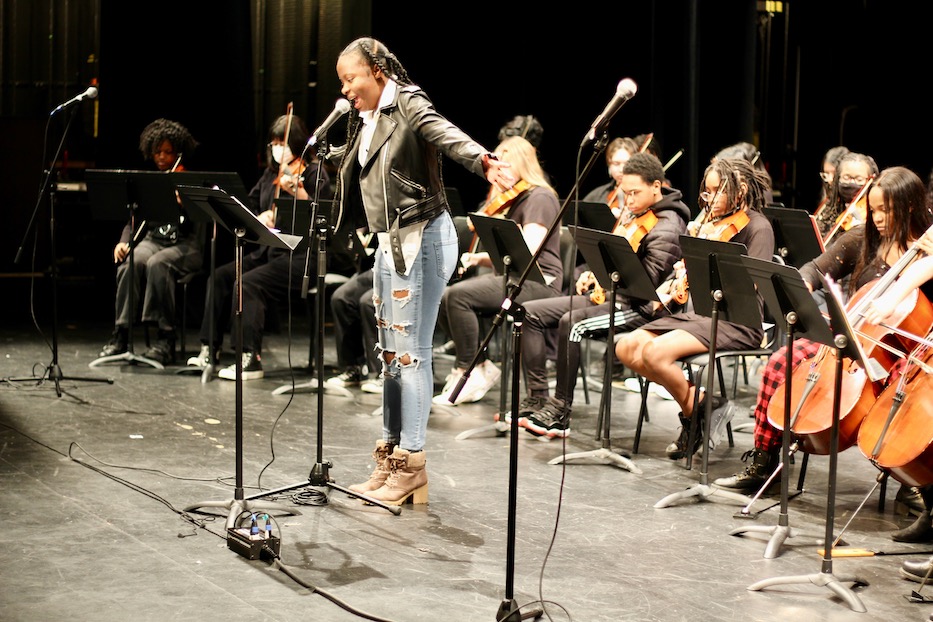
Co-Op High School | Culture & Community | Downtown | Education & Youth | Arts & Culture | Arts & Anti-racism | Education
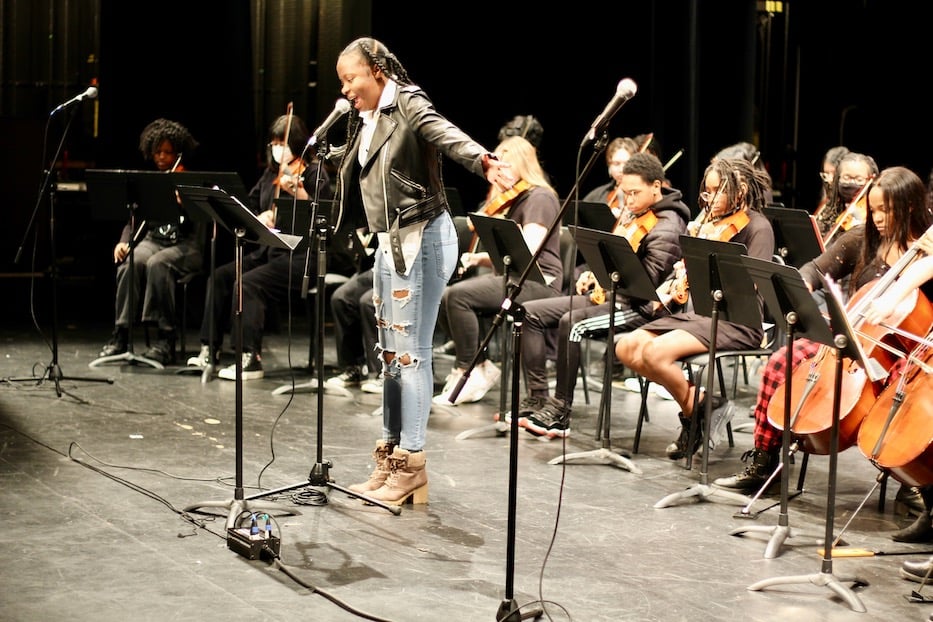
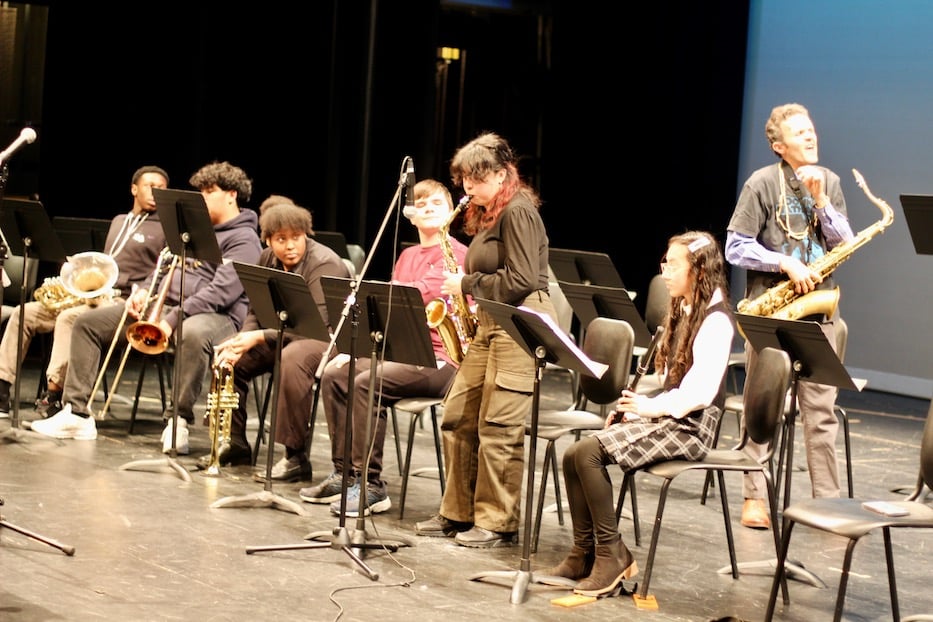
Top: Jeniya Henry and string performers during "Stand Up," directed with teacher Henry Lugo. Bottom: Members of the band include Keyla Gordillo Hernandez (flute), Lyanna Baez (alto saxophone), Maya Martinez (trumpet), Lucas Abbott (French Horn), Carlos Flores (trombone), Xavier Smith (euphonium), Jeremiah Serrano (xylophone), Jack Grindley (guitar), Elijah Mooring (electric bass), Seth Levey (drums) and Darnell Charles (auxiliary percussion). Lucy Gellman Photos.
The first notes of Duke Ellington’s “In A Sentimental Mood” rang out across the darkened auditorium, transforming it into a bright bandshell. Beneath a steady growl of horns, keys and bass crept in, then percussion with a thrumming, urgent bah boom. To cheers from the audience, Carlos Flores stood, working the slide of his trombone as if he were cutting through butter. Beside him, Xavier Smith propped up his euphonium, and waited for his chance in the spotlight.
That sound blessed the stage at Cooperative Arts & Humanities High School last week, as “Ode To Black Joy” filled the school’s auditorium with song, poetry, and band and orchestral arrangements for close to two hours. The brainchild of freshman Zayla Cox and a small group of students, the event received support from teachers Mercedes Mckelvie and Trinity Webber, who are both relatively new to the school.
"I'm Black, and Black history is such a heavy weight on me personally, because I want to teach others but I also want to be able to enjoy this month that is mine," said Cox, who emceed the event. "I loved being able to work with my teachers, being able to voice my opinion, and being able to do what felt right and felt right for me."
It marks the first time since early 2020 that students have been able to gather for a Black History Month performance. Years ago, the assemblies began under Arts Director Tim Jones, who is now pursuing his doctorate in theater and performance studies at Stanford University. When the pandemic hit, they ended abruptly. While Assistant Principal Amy Migliore and tech theater teacher Janie “Ms. A” Alexander talked about the idea last year, they worried they didn’t have the bandwidth to pull it off.
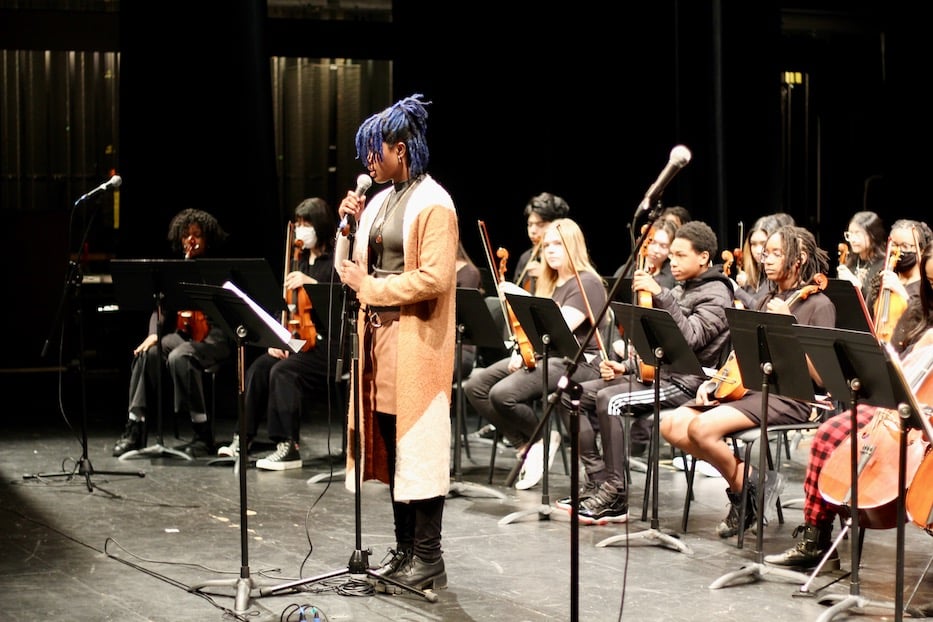
Freshman Zayla Cox, who also goes by Z and Zay.
Enter Webber and Mckelvie, who are in their first and second year at the school respectively. After they floated the idea, students approached them with interest. They put up flyers, and watched as performers built a program from the ground up. “There are so many different ways for students to take ownership of their learning,” Mckelvie said in a phone call after the assembly. “We were just there facilitating.”
As soon as the lights came down on the school’s auditorium, that after-school-ready-to-be-back energy was palpable, crackling in the air as students cheered for classmates still waiting in the wings. As they filled the stage, string musicians launched into an arrangement of "Lift Every Voice and Sing" that made it hard not to hum along. From the stage, the cellos formed a low, full-bellied tide, violins singing jubilantly above them.
Onstage, strings instructor Henry Lugo conducted carefully as the sound rolled from the lip of the stage and into the audience, spinning a story of resistance through poetry. Around the auditorium, beams of bright light appeared as students and faculty members alike pulled out their phones, and began to record. When the orchestra later flowed into an arrangement of Curtis Mayfield’s “People Get Ready,” Lugo fitted a guitar around his neck and played alongside the ensemble.
Every so often, the guitar would sing out in its tinny, spare voice, and strings would respond, buoyant and also insistent. As he played, Lugo conducted in a series of head nods and tapping feet, listening as the strings swelled and dipped around him.
As if Mayfield had opened a bridge between past and present, Lugo ushered in Florence Price’s “Adoration,” his hands gliding gingerly through the air as he cued the violins, the violas, then the cellos. He kept the momentum going as student Jeniya Henry joined the orchestra on stage, and took a deep breath before launching into Cynthia Erivo’s “Stand Up.” The cellos played her in, close to a heartbeat as they marched forward.
Her voice undulated over them, breaking just before the chorus. On the line And I don't mind if I lose any blood on the way to salvation/And I'll fight with the strength that I got until I die, it became a wail. As she took another deep breath, the violins trilled, and it was almost as if the instruments were breathing. By the times she entered the final bars, in which the chorus becomes a piece of sheer praise, students and staff clapped along.
“Come on!” someone yelled from the center of the auditorium. Phones came out again, filming as Henry relaxed into the lyrics, and belted right on cue. Her arms, which had been gripping the mic, let themselves fall to her sides, and then soar slowly upwards like wings. It rang true to Cox’s pre-song promise that “the technical quality of this song is breathtaking, an incredible richness.”
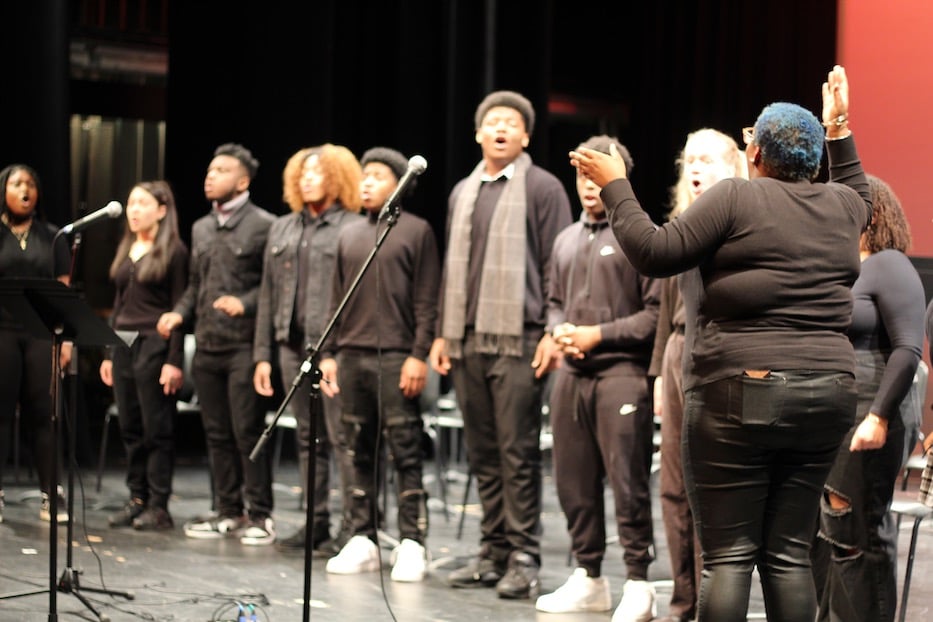
Senior Anniya Taylor-Beam, who wants to study music education, conducts the choir.
Students were just getting started. Weaving in poetry and song, they paid homage to artists past and present, from Koleka Putuma and Sam Cooke to oral traditions that have been passed from generation to generation. No sooner had a dozen choir students shuffled onstage than senior Anniya Taylor-Beam lifted her hands, and ushered in centuries of history.
“You rock my soul in the/bosom of Abraham,” students sang, and the auditorium was suddenly a sanctuary. Beam, herself an aspiring educator, savored the moment, her hands steady and succinct as they urged singers forward. Around her, the song ebbed and flowed, carrying with it a spiritual and sonic tradition born hundreds of years ago.
When soloist Kurtis Hughes approached the mic, the audience cheered so loudly that the sound nearly swallowed the first part of his solo. When the choir exploded into a burst of clapping hands and stomping feet, attendees yelled back, some almost standing from their seats. So too as the choir flowed into “Ride On, King Jesus,” adding choreography as they moved through the song.
“Can I be honest for a minute, y’all?” Cox said as she introduced the next performer. “Man, I love Black people.” Audience members cheered, snapped, and raised their arms in return.
So too when band members rolled in with teacher Matt Chasen, paying homage to Duke Ellington with a three-number set. Before students played, Chasen noted that American music owes a very great (and often unacknowledged) debt to Black music and Black history, including the brutal and forced migration of West Africans from their land and their lives into enslavement.
Jazz, and American music more broadly, “would not be what it is without the inherently African component,” he said. “The music of Black America is the music of America, plain and simple. That history, it’s pretty deep and it’s pretty storied.”
In interviews after the performance, several students noted how moving it felt to bring the assembly back. Ali’jah Steed, a sophomore who is studying choir with Ms. Harriett Alfred, said that he was proud to raise his voice on the stage. He chose Sam Cooke’s “A Change Is Gonna Come,” because he finds the message prescient years after it was first written and performed. As he sang, his twin brother Aaron recorded it from the front row.
“With a lot going on today, I felt like the song was appropriate,” he said. “Not only was the song appropriate, but the program was appropriate. It’s a way to express not only our art, but [that] the color of our skin doesn’t define who we are.”
He remembered first hearing the song when he was nine or ten, when Monk Jazz and Steam Collective, Inc. Founder Marcella Monk Flake played it for him. He’s loved it ever since. He said that performing it for the assembly, feeling the words move through his body and then out into the world, gave him a profound sense of meaning.
“Black History, to me, is more like justice,” he said. “I feel like this is the month when we should especially be getting justice for all the things happening. There’s still things happening to this day, to this hour, to this minute, that needs to be addressed, and I feel like it’s very important for us to stand up for ourselves.”
Laila Kelly-Walker, a sophomore who performed Rhianna’s “Lift Me Up” alongside fellow student Imani Antunes (listen here), called the assembly “a great vibe.” When she and Antunes were choosing a piece to rehearse and perform, “something about that song tugged at my heartstrings,” she said. She was moved by how the audience responded as she sang, wrapping her in their support.
“I feel like I’m living in Black history right now,” she said. “It’s just truly beautiful, seeing people create every day.”
Cox, who moved to New Haven from North Carolina three years ago, was all smiles after the assembly, and said the performance gave her joy. Growing up, she battled a near-constant sense of stage fright every time she had to speak or perform in front of people. Not so on Co-Op’s stage, looking out at a room that wanted her exactly where she was.
"These people!” she said with a smile, a streak of electric blue running through her hair. “The people and the smiles and the cheering. When I got onstage, I just instantly felt embraced by everyone in the room. It did something to me.”
Webber, a creative writing teacher whose position became official following a Board of Education vote on Monday, called it a full-circle moment. When she headed from Co-Op to St. Thomas Aquinas College five years ago, she didn’t know that she’d be back, walking the same halls she once called home as a student. The faces are new, she said—but the energy she can feel from the young people still has the same, wild sense of possibility.
She and Mckelvie said that students are now interested in more peer-led performances, including one for Juneteenth 2023.
“I felt like a proud mom,” she said of the show. “I had my phone out the whole time, from the second they got on that stage. They just really shone up there.”

